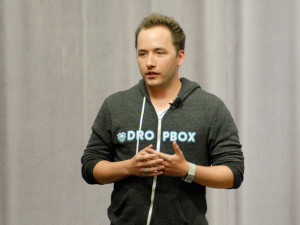“The whole start-up world is sort of like climbing Mount Doom,” said Drew Houston, CEO and co-founder of the file hosting service Dropbox, to a packed NVIDIA Auditorium on Wednesday afternoon. “You don’t really know how tall it is, but there is a lot of fire and things exploding around you. There’s a lot of smoke and it is very steep.”
Houston, invited as part of the DFJ Entrepreneurial Thoughts Leader Seminar, used the metaphor to explain the problems associated with starting a company as a recent college graduate.

“Even if you know where you are going right now, things are going to get gnarly down the road,” he said.
Rather than discouraging potential entrepreneurs, however, Houston sought instead to demystify the process of bringing a concept all the way to commercial actualization.
Drawing on his experience with Dropbox, which was created on a bus ride to New York and which currently enjoys a market valuation of billions of dollars, he encouraged students to leave the beaten path.
“People imagine that life is all about filling checkboxes,” Houston said. “They think the right path to a start-up is getting a bunch of graduate degrees, be a really good engineer, get an MBA, then work at a lot of different companies, and finally, sometime around their thirties, forties or fifties, they’ll be prepared to start a company.”
Houston emphasized that successful start-ups have rarely followed that path.
“Empirically, so many companies that you would think about in the hall of fame were started by people who, basically, didn’t know what the hell they were doing,” he said.
Houston cited several of Silicon Valley’s most successful companies — such as Facebook, Google and Apple — as examples of firms that were started by first- or second-time entrepreneurs learning how to run a successful business on the fly.
“Don’t be too daunted if you don’t have all the answers,” he advised the audience.
Houston emphasized the benefits of an environment such as Stanford for furthering entrepreneurial ambitions among fellow students with shared desire to change the world.
“Someone once said that you are the average of your five closest friends,” he said. “Being in an environment where people are also interested in start-ups and where you are all pushing each other can really be helpful.”
Houston originally moved to Silicon Valley, scrapping plans to found an SAT test preparation company when inspired by a friend’s ability to easily access funding from investors.
“I thought a lot about what I wanted to do next,” Houston said. “It had to be something deeply technical. I also wanted something that I could explain to people in a bar or a coffee shop and have them vaguely know what I was talking about and, finally, I wanted something with a working business model.”
In 2006, according to Houston, cloud storage was seen as the “next big thing — a parallel he drew with social networks and mobile apps today — but existing products were largely inadequate, with at least three items of software needed to back up, store and share data over the Internet.
“I can’t really imagine Tom Cruise in Minority Report logging in to his Gmail to pick up the attachment he sent himself that morning, or forgetting his thumb drive,” Houston emphasized.
In fact, Houston cited the experience of forgetting his thumb drive as his prompt to start coding Dropbox out of frustration at the lack of progress in cloud storage. A subsequent trip to California secured him a co-founder, Arash Ferdowsi, and funding from a number of venture capital firms.
“One thing you discover very quickly as a technical co-founder is that you know a lot about the engineer, but very little about the business side of things,” Houston said.
He added, however, that such skills are rapidly acquired with experience and pale in significance compared to being completely invested in a project.
Audience member George Burgess ‘15, chief operating officer at E2.0, expressed a favorable view of Houston’s talk.
“I pay for Dropbox and use it daily, so it was great to learn a bit more about what they’re working on and their priorities,” Burgess said. “Drew offered great insight into start-up life. It was particularly useful to hear about some of the mistakes he made in the early days of Dropbox.”